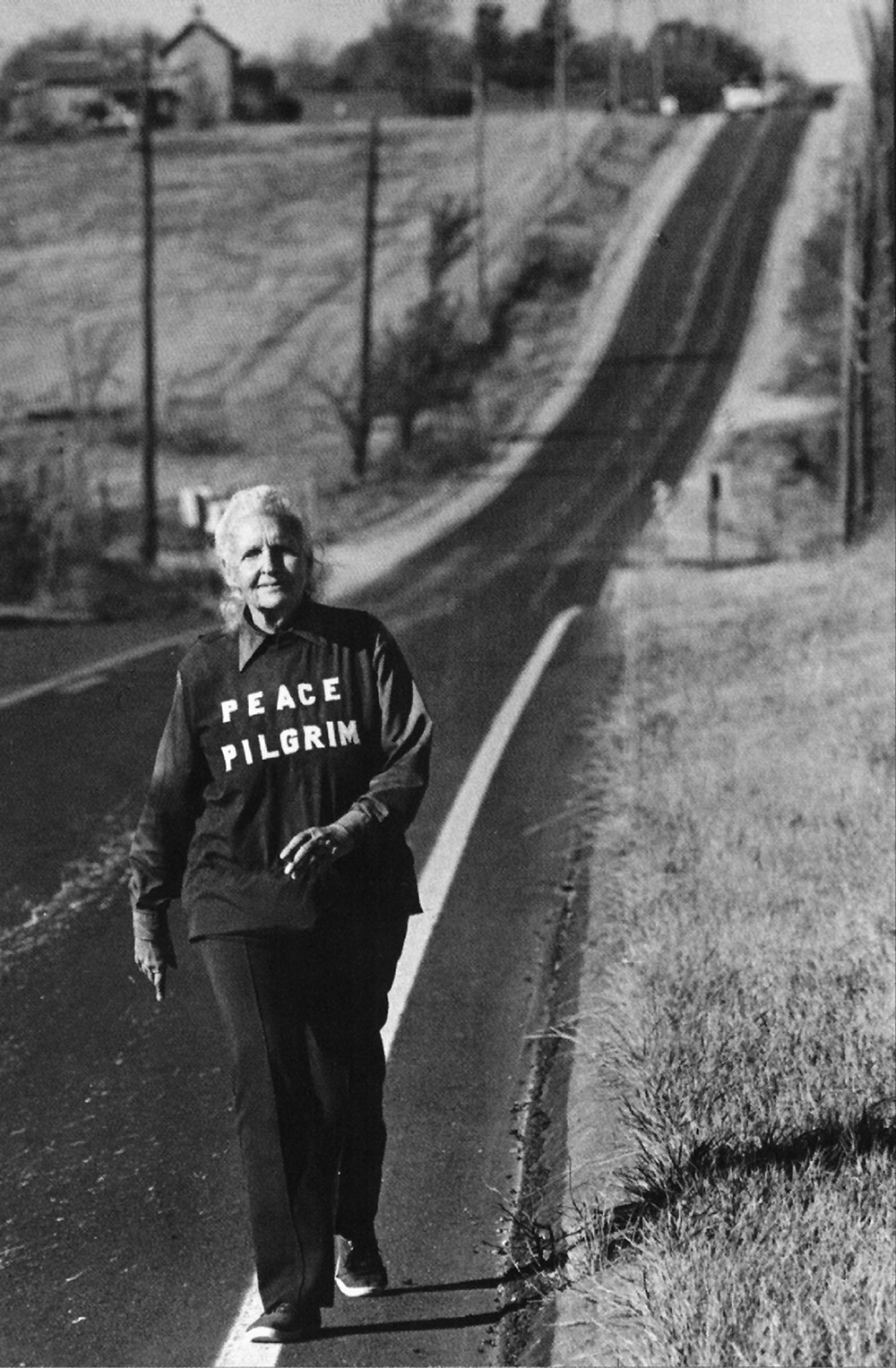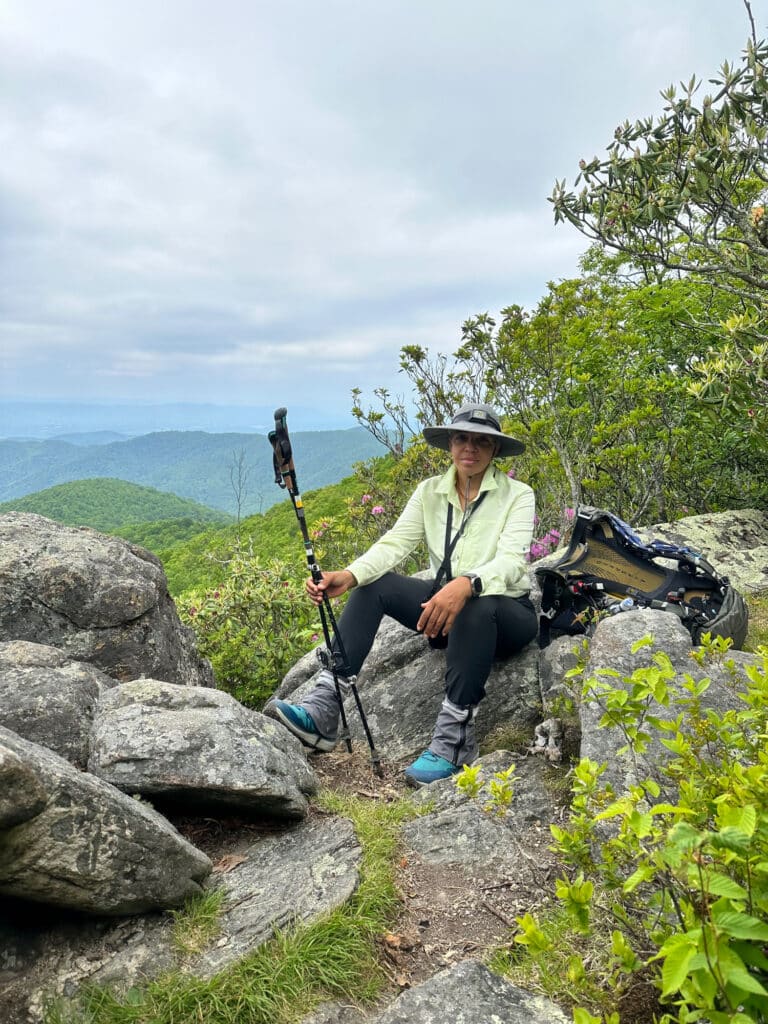The legacy of a 70-year-old thru-hike, which turned into a lifelong journey to make the world better
BEFORE SHE BECAME KNOWN AS PEACE PILGRIM, her name was Mildred Lisette Norman. And 70 summers ago, a walk on the Appalachian Trail changed not just her life, but the lives of countless others she would meet.
From May to October in 1952, Norman hiked 2,000 miles from Georgia to Maine, plus another 500 miles of side-trips. She became the first woman known to walk the entire length of the A.T. in one season, accomplishing her feat with no crew or reinforcements of equipment and supplies.
According to the posthumously published book, Her Life and Work in Her Own Words, the A.T.’s first flip-flop thru-hiker lived out-of-doors completely, supplied with only one pair of slacks and shorts, one blouse and sweater, a lightweight blanket, and two double plastic sheets, into which she sometimes stuffed leaves. “I was not always dry and warm,” she said, “but I enjoyed it thoroughly.”
For breakfast each day she had two cups of uncooked oatmeal soaked in water and flavored with brown sugar; at noon two cups of double strength dried milk, plus any berries, nuts, or greens she could find in the woods. “I thought of my fellow human beings eating various kinds of processed and flavored foods, and I realized that if I could choose my breakfast from all the foods in the world, I could not make a better choice than blueberries covered with dew.”
“In the spring and summer when the days are long,” she went on, “how good it is to get up with the sun and go to bed with the sun. How good it is to work in the invigorating fresh air under the life-giving sun amid the inspiring beauty of nature. How good it is to earn your livelihood by contributing constructively to the society in which you live—everyone should, of course, and in a healthy society everyone would.”
The inspiration from Norman’s time on the A.T. endured. Soon after completing her thru-hike, she put her feet in motion to back up these words.
On January 1, 1953, the woman who’d grown up on a chicken farm in Egg Harbor City, New Jersey, adopted the name ‘Peace Pilgrim’ and set out from Pasadena, California. Over the next 28 years, she would crisscross the United States on foot, speaking with her fellow human beings about peace.
Her pilgrimage spanned almost three decades and far surpassed her original goal of 25,000 miles. When she began walking, the Korean War was in progress and she walked all through the time of the Vietnam War and beyond.
When her pilgrimage began, she had taken a vow to “remain a wanderer until mankind has learned the way of peace, walking until given shelter and fasting until given food.” And for nearly three decades, she carried no money and lived only on what she was given, sleeping where given shelter, occasionally being locked up for vagrancy—an adversity that didn’t faze her or dampen her immense spirit in the least. On one occasion, she seized the opportunity of being jailed to inspire several wayward cell mates to change their lives.
In order for the world to become peaceful, Peace Pilgrim claimed, people must become more peaceful.
“Among mature people war would not be a problem – it would be impossible. In their immaturity people want, at the same time, peace and the things which make war. However, people can mature just as children grow up. Our institutions and leaders reflect our immaturity, but as we mature we will elect better leaders and set up better institutions.”
Peace Pilgrim was a frequent speaker at churches, universities, and on local and national radio and television programs. She appeared in the same attire each time. Her only possessions were the clothes on her back and the few items she carried in the pockets of her blue tunic which read ‘Peace Pilgrim’ on the front and ‘25,000 miles on foot for peace’ on the back.
Through small steps and years of endurance she continued to spread her message—walking and talking to bring about peace.
Peace Pilgrim was on her seventh cross-country journey when she died in an automobile accident on July 7, 1981, while being driven to a speaking engagement near Knox, Indiana.
In the years since, her words, deeds, and selfless legacy have lived on, specifically through the nonprofit Friends of Peace Pilgrim, which hosts events to celebrate her life.
Everything Peace Pilgrim did and all that she became seemed to have incubated during her months on the Appalachian Trail.
It’s been 70 years since Peace Pilgrim’s epiphany, and the trail she walked is still here, a long, winding wonder of nature that offers people a path to self-discovery.
As Peace Pilgrim put it: “It always comes back to the thing so many of us wish to avoid: working to improve ourselves.”
Cover Photo: Courtesy of Friends of Peace Pilgrim








